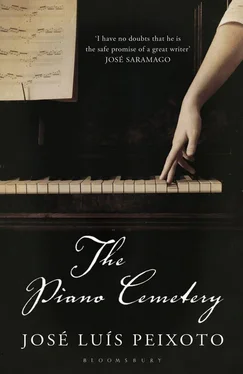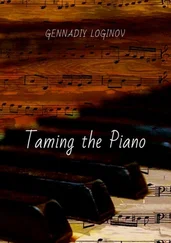Jose Luis Peixoto
The Piano Cemetery
But for those like us, our fate is to face the world as orphans, chasing through long years the shadows of vanished parents. There is nothing for it but to try and see through our missions to the end, as best we can, for until we do so, we will be permitted no calm.
Kazuo Ishiguro, When We Were Orphans
Neither pray I for these alone, but for them also which shall believe on me through their word; that they all may be one; as thou, Father, art in me, and I in thee, that they also may be one in us: that the world may believe that thou hast sent me. And the glory which thou gavest me I have given them; that they may be one, even as we are one: I in them, and thou in me, that they may be made perfect in one; and that the world may know that thou hast sent me, and hast loved them, as thou hast loved me. Father, I will that they also, whom thou hast given me, be with me where I am; that they may behold my glory, which thou hast given me: for thou lovedst me before the foundation of the world. O righteous Father, the world hath not known thee: but I have known thee, and these have known that thou hast sent me. And I have declared unto them thy name, and will declare it: that the love wherewith thou hast loved me may be in them, and I in them.
John 17, xx — xxvi
When I first began to be ill, I knew right away that I was going to die.
In the final months of my life, when I was still able to make it from our house to the workshop on foot, I would sit on a pile of planks and, unable to help with the simplest things — planing the frame of a door, hammering in a nail — I’d watch Francisco working, absorbed, in a mist of sawdust specks. I’d been like that when I was young, too. On those evenings — an impossibly long time after I was young — I made sure that he wasn’t watching me and, when I could bear it no longer, I would rest my head in my hands. I held the immense weight of my head — the world — and covered my eyes with my hands so as to suffer in the darkness, in a silence I feigned. Later, in the final weeks of my life, I went into hospital.
Marta never went to see me in hospital. She was pregnant with Hermes. It was in the final months, and the way Marta is meant that she needed a lot of attention during the time of her pregnancy. I suddenly remember when she was small and so happy on that scooter I bought for her second-hand; I remember when she used to go to school, I remember so much. While I was in the hospital waiting to die, Marta was in another hospital, not too far away, waiting for Hermes to be born.
‘How’s my father?’ Marta would ask, stretched out, hair unkempt, the hospital bed-sheets covering her belly.
‘Just the same,’ someone would reply, lying. Someone who was not my wife, nor Maria, nor Francisco, because none of them had the strength to lie to her.
The last evening I spent alive, my wife, Maria and Francisco went to see me. During the whole illness, Simão had never wanted to visit me. It was Sunday. I was separated from the other sick people, because I was going to die. I was trying to breathe and my breathing was a thick, hoarse buzzing that filled the room. At the foot of the bed my wife was crying, choked by her tears, by her contorted face and by the pain — the suffering. Without choosing her words, she spoke them in long, drawn-out, stretched-out howls, interrupted only by impatient drawings-in of breath. They were words that burned in her wasted body, her body dressed in a knitted jacket, a favourite skirt, polished shoes:
‘Oh my precious man my friend who’s my best friend and I’m left without you my precious man my companion my great great friend.’
Maria was crying and tried to hug her mother, to console her, because the two of them had the same feeling of a definitive and terrible emptiness in their breasts that I would have felt too if I had lost one of them. Francisco was looking out of the window. He was trying not to see. He was trying not to know what he knew. He was trying to be a man. Then he came closer to me, serious. In eternal time, in concrete time, he stroked my face, and rested his hand on my hand. On the bedside table, under the grey iron lid, he found a cup of water and a stick with a cotton tip. He wet the cotton in the water and placed it in my dry, open mouth. I bit on to it with all the strength I had, and Francisco was surprised to feel my strength for the last time. He removed the cotton. He looked at me, and cried too, because he couldn’t bear it any longer. Maria hugged him and treated him like she had when he was small:
‘Don’t be scared, my little boy, we won’t leave you alone, we’ll look after you.’
All my strength. I used all my strength and all I managed was a horrible, deathly sound. I wanted to say to Francisco and Maria that I wouldn’t leave them alone either; I wanted to say to them that I was the best friend they would ever have in their lives, that I would never leave them alone, would never stop being their father, and looking after them, and protecting them. Instead of this I used all my strength and only managed a horrible, deathly sound. The sound of a voice that could no longer speak, the sound of a voice that, using all its strength, managed only to make a hoarse sound with its throat, a horrible sound, a deathly sound. They looked at me, and they cried more, and they felt a terrible, black emptiness all through their hearts — deep down, deep down — which I would have felt too if I had lost one of them.
They went to Maria’s house, and each was left abandoned in a corner to their suffering. Far away, protected, Ana was two years old and was at the home of her paternal grandparents. Unprotected, my wife, Maria and Francisco waited for the telephone to ring. They waited for the call from the hospital with the news that I had died. This was what the nurse had said:
‘In theory we should be calling you today. We’ll phone as soon as your husband passes away.’
This was what the nurse had said. Without noticing, perhaps, that my wife was no longer anyone. Without noticing that the words she said to her disappeared without an echo inside her darkness.
The night, drifting. With the immoderate drift of worldly things, the night covered over all the places in the world that all existed only there: Maria’s house — the imitation porcelain dolls on the cupboard shelves, the covers on the sofas, the folded-over corners of the rugs, the imitation crystal lamps, the prints on the walls — and the house of birthday parties in which we tunelessly sang happy birthday, clapped our hands out of time with each other and laughed — and the house of Christmas parties, where I would sit on the sofa, and the tablecloth with the pictures of pine trees and bells would be laid out, and we would use the long-stemmed glasses. In this house, each person was left abandoned in a corner to their suffering.
At nine o’clock at night, the telephone rang. The telephone rang for a long moment, because no one wanted to answer it, because they were all afraid to answer it, because they all knew with great certainty that when they answered it the hope that lasted to the final second would definitively end, the almost three years of my illness would end which we always knew would lead me to my death, would lead me to that telephone ringing that no one wanted to answer. The telephone rang. The sound passed through the house and through the breast of my wife, and Maria’s, and Francisco’s. It was Maria’s husband who answered it. His words in a black suspension of time, as if in a shadow of time:
‘Yes, yes. All right. I’ll tell them.’ He approached my two children and my wife and told them. An invisible wall between his face and the words he spoke. An invisible wall between the world and the words he spoke. A wall that didn’t allow the immediate understanding of such simple words. Hermes had just been born.
Читать дальше












